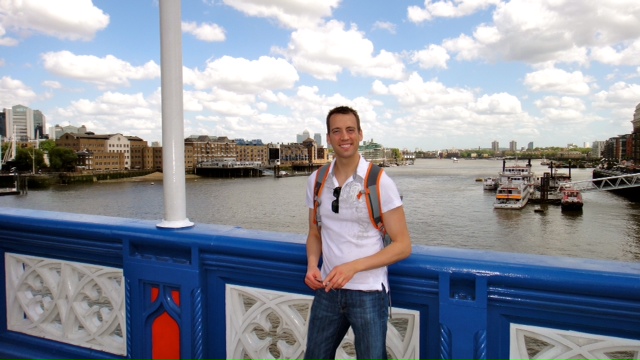If It’s Time to Leave…

by Timothy Weymann
I grew up in a devout Mormon family and was a committed Mormon boy, teenager and young adult. Thus, the process of ending my relationship with Mormonism was a gradual and drawn out one. I slowly reduced my activity and involvement out of psychological necessity. As I aged it continually became more painful and alienating for me to stay involved with a church that didn’t recognize me as a gay man and repeatedly left me feeling inadequate.
As I reached an age when Mormon young men and women begin to marry, the notion of how I was not accepted or celebrated in my Church became unignorable. As my friends found marriage partners and moved on with life, while being celebrated for doing so, I was expected to watch and cheer from the sides. I was left behind and alone. Adding to the pain were the repeated reminders through doctrine that I was condemned for who I was. At the time I decided to leave I don’t think I could have fully verbalized exactly why I was leaving, I just knew that I was hurt and that I was seeking refuge from all of the pain I was experiencing.
Years preceding my eventual departure, I remember as a young college student, sitting in the back of an LDS singles ward. They had just finished talking about heterosexual marriage and how important it was. I sat in the back and cried with such intensity from all the built up anguish I felt over the years, knowing that I couldn’t/wouldn’t have what I was told I should want. As a side note, this is one of the reasons I love the lyric from the song “Same Love” by Mackelmore that states, “I’m not crying on Sundays” – because it’s a sentiment that now rings true for me!
I know that deciding whether or not to leave is a very personal process and like any relationship can be an ongoing decision. I decided to leave when I realized this was what I most needed in order to be healthy and happy. If you find yourself at a similar decision point, these are a few strategies that I’ve used that helped me leave:
Get to know your courage. The idea of leaving was very frightening, I doubted myself; fearing what would happen with my friends and family, worrying what God would think of me, and what ramifications await me in the afterlife because of my departure. Yet, the pain I continued to experience, the lack of self-worth that was created in me and the alienation I felt was strong enough to push me forward. As I pushed on I was able to create my own independence and my confidence grew in my abilities to deal with life and my spirituality without the Church. In some ways my sense of spirituality actually increased because I was free from the continued wounding!
Critically re-evaluate what beliefs/standards are true for you. I extensively studied alternative views of Mormonism by listening to podcasts, reading literature and consuming other media created by Mormons who were struggling with their Church identity, or who had left Mormonism altogether. Doing this helped me realize that there are many different interpretations of Mormonism and many different experiences that are similar to mine. This helped me alter beliefs that were harmful to me. It also decreased my isolation and validated the feelings I was experiencing.
Maintain practices, values and ideas that fit you. I realized that the Mormon Church was my church just as much as it is the prophet’s, or anyone else’s for that matter. Just because I left it didn’t mean I had to give up things I liked about it. For example, to this day I don’t drink alcohol. This comes from my Mormon roots, but continues because it’s a good fit for me; I like the consequences of abstaining. I realize I get to choose what fits me and what doesn’t.
Build and maintain supportive relationships. I stopped going to church and slowly came out to supportive family members and friends who are Mormon. I stayed close to those who supported me, those who loved me no matter what. I redirected the energy I would use to try and get unsupportive extended family members, friends and associates to support me and spent it on increasing time and intimacy with those who accepted me, regardless of my sexual orientation and the status of my Church membership.
Identify the hurt you’ve experienced as abuse. One of the ways I worked through the difficulty of departing was to identify that the hurtful experiences I encountered with Mormonism were actually abusive. I recognized this by understanding that abuse happens when one person in a relationship treats us in a cruel manner, in some cases repeatedly. The abuse typically comes from someone who has more authority or power than us. This power is often what makes it harder for the abuser’s abusive behavior to be challenged and stopped. Abusers lack empathy for our plight, minimize our hurt (or deny it exists) and continue the behavior, even when confronted about it.
Abusive behaviors can be very complex because abuse is often perpetuated by someone we love and care about! For those of us who are abused by a loved one, we may find it hard to accept the fact the abuse is occurring because the abuser, in some instances, is good to us or provides us with other benefits for being in relationship. In addition, our feelings of strong attachment from love and bonding can make it difficult to reconcile the fact that the abuser is harming us. A person may love a family member who harms him/her, but this love does not negate the fact that abusive behavior is occurring. Similarly, I realized that just because I loved the Church, it doesn’t mean it wasn’t abusive to me.
If the abuser recognizes the harm s/he’s done, gets help to change and stops the abusive behavior, than exposure to him/her can be maintained. If they don’t do these things than it is my right to do what I need to protect myself, including leaving!
Honor your connection to everyone in the world. I also began expanding my social circle outside of Mormonism and began to see others in a whole new light. When I left Mormonism I feared disconnection from “my people”, as they were, and I felt such a sense of loss, loneliness and fear of what my departure may mean. Something that I did not perceive while in my grief is that there was an entire world of people that could not only fill that gap, but even surpass the breadth of connection I once felt. This occurred as my perspective of my identity transitioned from being a member of the Church of Jesus Christ of Latter-day Saints, to a member of humanity. You are not alone!

This is probably the best writing I have come across for this topic. Tim, this piece will be published beyond this blog. As a soon-to-be editor of a volume directly relating to LDS LGBTresearch, I will make sure of it. Will contact you privately.
Love this Tim!!
What a lovely and helpful article. Thank you for sharing your experience. I’m glad you are doing well and caring to help others make it through similar difficulties.
Tim
Thanks for sharing your valuable insights and experience. That was a very well written and I am sure it can help a lot of people. I got excommunicated many years ago when I finally got tired of living the life of a lie and my acting career on Sundays. It left quite a void but I was led to a much more beautiful spiritual path that is accepting of homosexuality. I was not ready to give up my beliefs in Christ and they had teachings that were very loving. When I look back at it I never really felt any true love from Mormon scriptures although I sure tried to find it there.
Thanks again for taking the time to share your experiences.
Spence
Thanks for sharing your story. I just came out to my family yesterday. It was the hardest thing that I’ve ever done in my life. Your story helped to give me some direction as to where to start.
Thanks Timothy for this wonderful article.
I’ve listened to your Sunsone Presentations about Navigating the Borderlands. Very insightful
For someone who’s having a faith crisis, what might the pros and cons of going” inactive” versus “resigning” especially when one still has family members very involved with the church?
God bless.